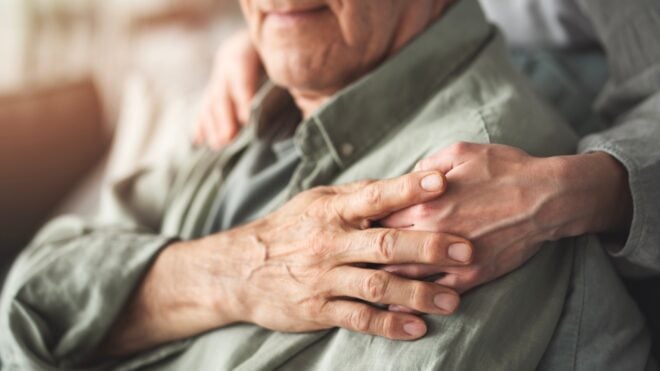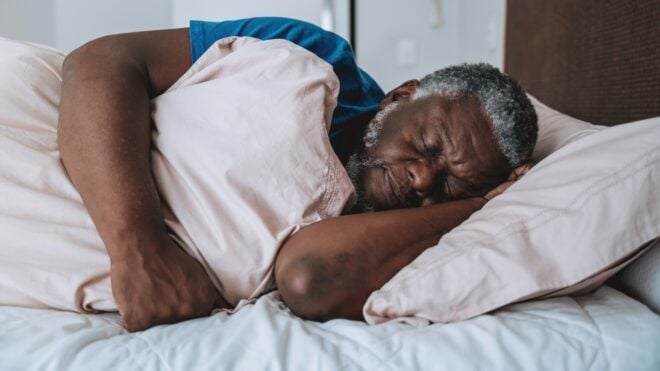
October 18 was national menopause day, and many great organizations are spreading menopausal awareness this month. Whether it’s in the near or distant future, or it’s happening right now, knowing what you’re in for during menopause is vital to having a smoother ride. It’s a roller coaster of a journey, full of physical and emotional changes that can be overwhelming at first. If you aren’t going to go through menopause yourself, it’s important to learn what your menopausal family members, friends, and partners will go through one day.
Despite there being a thorough amount of information and resources out there for menopause, there are just as many myths circulating the web. Myths around gender, symptoms, age, and more that can really paint a negative and erroneous image of menopause.
More from LittleThings: Is It Possible To Delay Menopause And Preserve Fertility Longer? Scientists Have Answers
Here are five myths busted, for an easier menopausal journey.
Myth 1: Only women go through it.
When discussing anything related to bodily health, we need to make our language as inclusive as possible. Cis women, trans men who haven’t gone through HRT, nonbinary folk, intersex people; there are so many groups of folk that go through menopause, so why should we only talk about one of them? Menopause can be a frightening, uncomfortable time for many, so making sure important medical information is available to everyone is vital in understanding it. Medical staff in particular need to make sure they're dealing with menopause for non-women with respect and delicacy, as for some, the process may trigger body dysmorphia.
There's also a theory that cis men go through their own brand of menopause but with slightly different symptoms. So in a way, the majority of people will go through it at some point in their lives. It's also important for non-menopausal people to understand it, as they will know someone who will go through it.
Myth 2: Your body will 'deteriorate.'

Though your body will change post menopause, there's a misogynistic, fat-phobic, and ableist view of how these changes present. People hear that your weight can fluctuate post menopause and all they hear is “you’ll get fat,” which brings a negativity towards plus-size folk, but also isn’t entirely accurate anyway. Though plenty of menopausal people have experienced weight gain, there is no quantifiable scientific evidence that menopause, or HRT, is responsible for the weight gain that occurs during middle age. It may be correlation as opposed to causation, in other words. There’s also evidence that it’s not so much an increase of fat, as it is a shift in fat distribution. So it’s the same fat, but from a different part of your body. Either way, the idea that weight gain or distribution is seen as a negative, isn’t helpful.
Some people don't even notice much visual difference apart from the immediate menopause symptoms, their weight doesn't fluctuate even with diet or exercise changes. Similarly, the way we look at decreased levels of bone density is also problematic, as it adds to the stereotype of menopausal folk being “old” and unable to do physical activity past a certain age.
Though there is an increased risk of osteoporosis with menopause, the decline in density is a hell of a lot lower than we once thought. According to Life Extension, it's a whopping 75% lower than originally estimated. With their reports estimating a 0.4% drop per year. So don't give up on rock climbing or tennis anytime soon!
Myth 3: You can't get pregnant.

For most people, menopause generally means they can no longer get pregnant. However, this isn't set in stone. Though it’s rare, there have been cases of postmenopausal pregnancy. After the age of 40, you run the 5% chance of getting pregnant for every month you try to conceive, so this number is even smaller after going through menopause. Despite these figures, it’s not always impossible. A case report was done back in 2020 about a 55-year-old woman who was experiencing postmenopausal bleeding (six years after menopause); turns out she was pregnant. The baby was a month early, but was otherwise healthy.
Unfortunately, pregnancy in the postmenopausal stage comes with risks that aren’t as prevalent in pre menopause, such as — according to the case study — “gestational diabetes, dystocia, placenta previa, breech presentation, emergency cesarean delivery, postpartum hemorrhage, preterm birth, low birth weight, and macrosomia.” While it’s a rare occurrence, doctors suggest that if you don’t plan on having a child post-menopause then it's best to use birth control.
Myth 4: It means you're old.

Being "old" is a state of mind, and many people have widely different ages in mind when they consider who is young and who is old. I hear 30-year-olds call themselves old, and 70-year-olds saying they're nowhere near the vibe of elderly. So going through menopause doesn't define your place in this world. That being said, there is also the fact that teenagers can go into early menopause. Approximately 5% of people go through premature menopause, and certain lifestyle choices, such as smoking, can increase that chance by 15%. If you’ve had your ovaries or uterus surgically removed, your chances of premature menopause increase also. Other risk factors are autoimmune diseases, chronic fatigue syndrome, chemo/radiation therapy, and general hereditary factors.
But going back to when the average person goes through menopause at 45 to 55 years of age</a>; since when was middle-age old? It’s the halfway point of life, not the end. So we really need to end the idea that going through menopause, especially for women, means they're "over the hill," or "past their prime," as it's not only incorrect, but misogynistic.
Myth 5: You don't need to see a doctor.

Although menopause is a natural, normal process, it's a dangerous myth that you shouldn't seek help for it. Not only could there be complications in how your body responds to it, but even if you are experiencing it as you should, there's no reason not to seek support for the symptoms.
Your doctor can prescribe hormonal medication, painkillers, antidepressants, diet changes, osteoporosis medication, antacids, exercise changes, and anything else you need to counter symptoms and make you feel a lot better in the long run. They can also help with the increased risks of urinary tract infections, cardiovascular disease, and osteoporosis. Society, namely the patriarchy, thinks we should suffer in silence — much like with periods — but there are tons of treatments, therapies, and support systems in place for menopause for a reason.
If you feel something isn't right, it's always better safe than sorry to contact your general practitioner or obstetrician-gynecologist for a check-up. You know your body better than anyone, so fight for it if the time comes. Since decreasing levels of estrogen and progesterone can cause mood swings, there's also the option of seeking counselling to deal with depressive episodes. Just because it's caused by something internal — as opposed to an outside factor like grief or work stress — doesn't mean you don't deserve therapy to help counter it.




